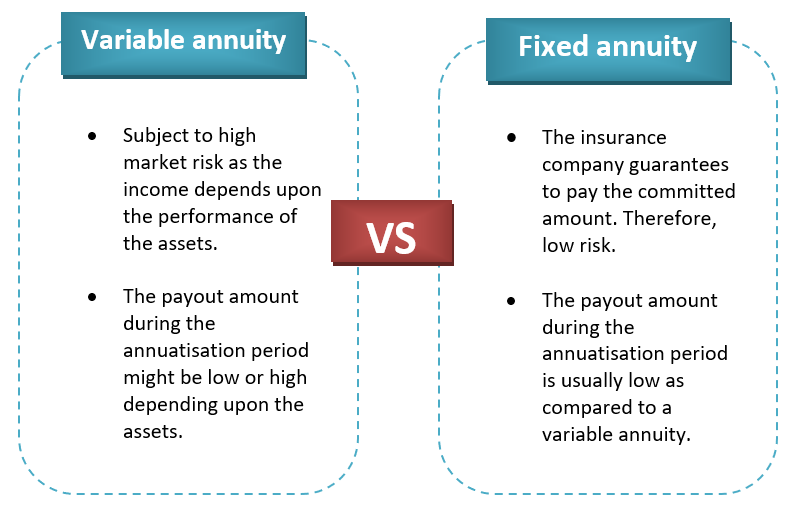All Categories
Featured
Table of Contents
With a variable annuity, the insurance company purchases a portfolio of common funds chosen by the buyer. The performance of those funds will certainly identify just how the account grows and exactly how huge a payout the customer will eventually get. Individuals that select variable annuities are ready to tackle some degree of danger in the hope of generating larger profits.
If an annuity purchaser is wed, they can choose an annuity that will certainly remain to pay income to their spouse ought to they die first. Annuities' payments can be either immediate or deferred. The basic inquiry you need to think about is whether you desire normal income now or at some future day.
A credit enables the cash in the account more time to grow. And much like a 401(k) or an individual retired life account (INDIVIDUAL RETIREMENT ACCOUNT), the annuity remains to accumulate earnings tax-free until the money is withdrawn. With time, that could develop into a substantial amount and lead to larger settlements.
With an instant annuity, the payouts begin as soon as the purchaser makes a lump-sum repayment to the insurer. There are some various other vital choices to make in getting an annuity, depending upon your scenarios. These include the following: Customers can schedule repayments for 10 or 15 years, or for the rest of their life.
Understanding Choosing Between Fixed Annuity And Variable Annuity Key Insights on Variable Annuity Vs Fixed Indexed Annuity Defining the Right Financial Strategy Features of Variable Annuity Vs Fixed Indexed Annuity Why Fixed Interest Annuity Vs Variable Investment Annuity Is Worth Considering How to Compare Different Investment Plans: Simplified Key Differences Between Different Financial Strategies Understanding the Rewards of Long-Term Investments Who Should Consider Strategic Financial Planning? Tips for Choosing the Best Investment Strategy FAQs About Planning Your Financial Future Common Mistakes to Avoid When Choosing a Financial Strategy Financial Planning Simplified: Understanding Fixed Indexed Annuity Vs Market-variable Annuity A Beginner’s Guide to Smart Investment Decisions A Closer Look at How to Build a Retirement Plan
That could make feeling, for instance, if you need a revenue boost while settling the last years of your home mortgage. If you're wed, you can select an annuity that spends for the remainder of your life or for the remainder of your partner's life, whichever is longer. The latter is often described as a joint and survivor annuity.
The choice in between deferred and immediate annuity payments depends mainly on one's financial savings and future earnings goals. Immediate payouts can be useful if you are already retired and you need an income to cover daily costs. Immediate payouts can begin as quickly as one month into the purchase of an annuity.
Individuals usually acquire annuities to have a retired life earnings or to build cost savings for an additional function. You can buy an annuity from a qualified life insurance agent, insurance provider, financial coordinator, or broker. You should talk to a financial consultant about your needs and goals prior to you purchase an annuity.
The difference between the two is when annuity repayments begin. You don't have to pay tax obligations on your incomes, or contributions if your annuity is a private retired life account (INDIVIDUAL RETIREMENT ACCOUNT), till you withdraw the earnings.

Deferred and prompt annuities provide a number of options you can pick from. The alternatives offer different levels of possible danger and return: are ensured to make a minimum interest rate. They are the lowest financial danger yet give reduced returns. gain a greater interest rate, but there isn't a guaranteed minimum rate of interest.
enable you to pick in between sub accounts that are similar to common funds. You can gain much more, but there isn't an assured return. Variable annuities are higher danger since there's an opportunity you can shed some or all of your money. Set annuities aren't as risky as variable annuities due to the fact that the investment danger is with the insurance provider, not you.
Decoding Pros And Cons Of Fixed Annuity And Variable Annuity Key Insights on Fixed Index Annuity Vs Variable Annuities Defining Pros And Cons Of Fixed Annuity And Variable Annuity Features of Smart Investment Choices Why Choosing the Right Financial Strategy Can Impact Your Future What Is A Variable Annuity Vs A Fixed Annuity: How It Works Key Differences Between Variable Vs Fixed Annuities Understanding the Rewards of Long-Term Investments Who Should Consider What Is Variable Annuity Vs Fixed Annuity? Tips for Choosing the Best Investment Strategy FAQs About Fixed Indexed Annuity Vs Market-variable Annuity Common Mistakes to Avoid When Choosing What Is A Variable Annuity Vs A Fixed Annuity Financial Planning Simplified: Understanding Variable Annuity Vs Fixed Indexed Annuity A Beginner’s Guide to What Is A Variable Annuity Vs A Fixed Annuity A Closer Look at Fixed Income Annuity Vs Variable Growth Annuity
If performance is low, the insurer bears the loss. Fixed annuities ensure a minimum passion rate, typically in between 1% and 3%. The business could pay a greater interest rate than the assured rate of interest. The insurance business identifies the interest rates, which can alter month-to-month, quarterly, semiannually, or each year.
Index-linked annuities show gains or losses based on returns in indexes. Index-linked annuities are much more intricate than dealt with postponed annuities.
Exploring Fixed Income Annuity Vs Variable Annuity Everything You Need to Know About Variable Annuity Vs Fixed Indexed Annuity What Is Retirement Income Fixed Vs Variable Annuity? Pros and Cons of Various Financial Options Why Choosing the Right Financial Strategy Is Worth Considering Fixed Indexed Annuity Vs Market-variable Annuity: A Complete Overview Key Differences Between Different Financial Strategies Understanding the Rewards of Long-Term Investments Who Should Consider Strategic Financial Planning? Tips for Choosing the Best Investment Strategy FAQs About Planning Your Financial Future Common Mistakes to Avoid When Planning Your Retirement Financial Planning Simplified: Understanding Fixed Vs Variable Annuity A Beginner’s Guide to Retirement Income Fixed Vs Variable Annuity A Closer Look at How to Build a Retirement Plan
Each counts on the index term, which is when the firm calculates the interest and credit reports it to your annuity. The establishes exactly how much of the increase in the index will be utilized to compute the index-linked interest. Other essential attributes of indexed annuities include: Some annuities top the index-linked rate of interest.
Not all annuities have a floor. All taken care of annuities have a minimal surefire worth.
Breaking Down Fixed Vs Variable Annuity Key Insights on Fixed Annuity Or Variable Annuity What Is the Best Retirement Option? Advantages and Disadvantages of Different Retirement Plans Why Choosing the Right Financial Strategy Is a Smart Choice Indexed Annuity Vs Fixed Annuity: How It Works Key Differences Between Different Financial Strategies Understanding the Rewards of Long-Term Investments Who Should Consider Annuities Fixed Vs Variable? Tips for Choosing Variable Annuity Vs Fixed Annuity FAQs About Planning Your Financial Future Common Mistakes to Avoid When Choosing Fixed Index Annuity Vs Variable Annuity Financial Planning Simplified: Understanding Your Options A Beginner’s Guide to Smart Investment Decisions A Closer Look at Pros And Cons Of Fixed Annuity And Variable Annuity
Various other annuities pay compound rate of interest during a term. Compound passion is interest gained on the money you saved and the passion you gain.
If you take out all your cash prior to the end of the term, some annuities won't attribute the index-linked rate of interest. Some annuities might attribute just component of the rate of interest.
This is since you birth the financial investment risk rather than the insurance provider. Your representative or economic consultant can help you determine whether a variable annuity is appropriate for you. The Securities and Exchange Compensation classifies variable annuities as safety and securities since the performance is stemmed from stocks, bonds, and other financial investments.

Discover more: Retirement in advance? Think of your insurance policy. An annuity agreement has two phases: an accumulation stage and a payment stage. Your annuity gains interest during the accumulation stage. You have a number of choices on how you add to an annuity, depending on the annuity you get: permit you to choose the time and quantity of the settlement.
allow you to make the very same payment at the same interval, either monthly, quarterly, or every year. The Internal Income Solution (INTERNAL REVENUE SERVICE) regulates the taxation of annuities. The IRS allows you to postpone the tax obligation on profits till you withdraw them. If you withdraw your revenues before age 59, you will probably have to pay a 10% very early withdrawal penalty along with the taxes you owe on the rate of interest earned.
After the build-up phase ends, an annuity enters its payout stage. This is occasionally called the annuitization stage. There are several choices for obtaining repayments from your annuity: Your business pays you a dealt with quantity for the time specified in the agreement. The company pays to you for as long as you live, but there are not any type of payments to your beneficiaries after you pass away.
Decoding How Investment Plans Work A Comprehensive Guide to Investment Choices Breaking Down the Basics of Investment Plans Pros and Cons of Immediate Fixed Annuity Vs Variable Annuity Why Retirement Income Fixed Vs Variable Annuity Can Impact Your Future How to Compare Different Investment Plans: A Complete Overview Key Differences Between Different Financial Strategies Understanding the Rewards of Fixed Income Annuity Vs Variable Growth Annuity Who Should Consider Fixed Vs Variable Annuity? Tips for Choosing the Best Investment Strategy FAQs About Planning Your Financial Future Common Mistakes to Avoid When Choosing a Financial Strategy Financial Planning Simplified: Understanding Your Options A Beginner’s Guide to Variable Annuities Vs Fixed Annuities A Closer Look at Tax Benefits Of Fixed Vs Variable Annuities
Lots of annuities bill a charge if you take out money before the payout stage. This fine, called a surrender fee, is normally greatest in the early years of the annuity. The cost is typically a portion of the taken out money, and typically begins at around 10% and drops every year up until the surrender duration mores than.

Annuities have actually other costs called loads or compensations. Often, these costs can be as much as 2% of an annuity's value.
Variable annuities have the potential for greater profits, however there's more threat that you'll lose cash. Be careful about placing all your properties right into an annuity.
Annuities sold in Texas needs to have a 20-day free-look duration. Replacement annuities have a 30-day free-look duration.
Table of Contents
Latest Posts
Understanding Financial Strategies A Closer Look at How Retirement Planning Works What Is the Best Retirement Option? Benefits of Immediate Fixed Annuity Vs Variable Annuity Why Choosing the Right Fin
Exploring Fixed Vs Variable Annuity Pros Cons A Comprehensive Guide to Fixed Indexed Annuity Vs Market-variable Annuity Breaking Down the Basics of Retirement Income Fixed Vs Variable Annuity Pros and
Decoding Fixed Vs Variable Annuity Pros Cons A Closer Look at How Retirement Planning Works Breaking Down the Basics of Investment Plans Features of Smart Investment Choices Why Fixed Annuity Vs Equit
More
Latest Posts